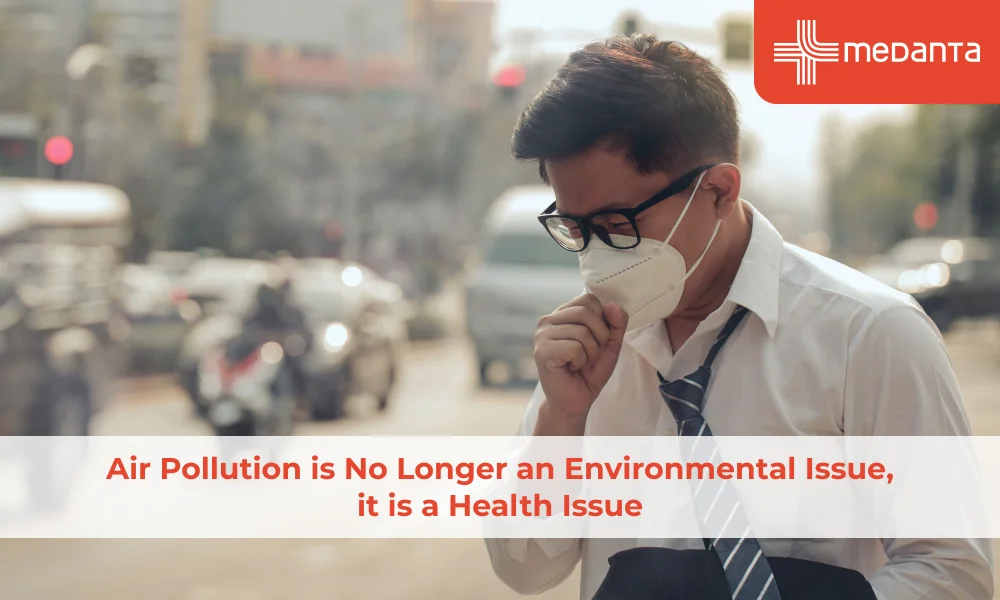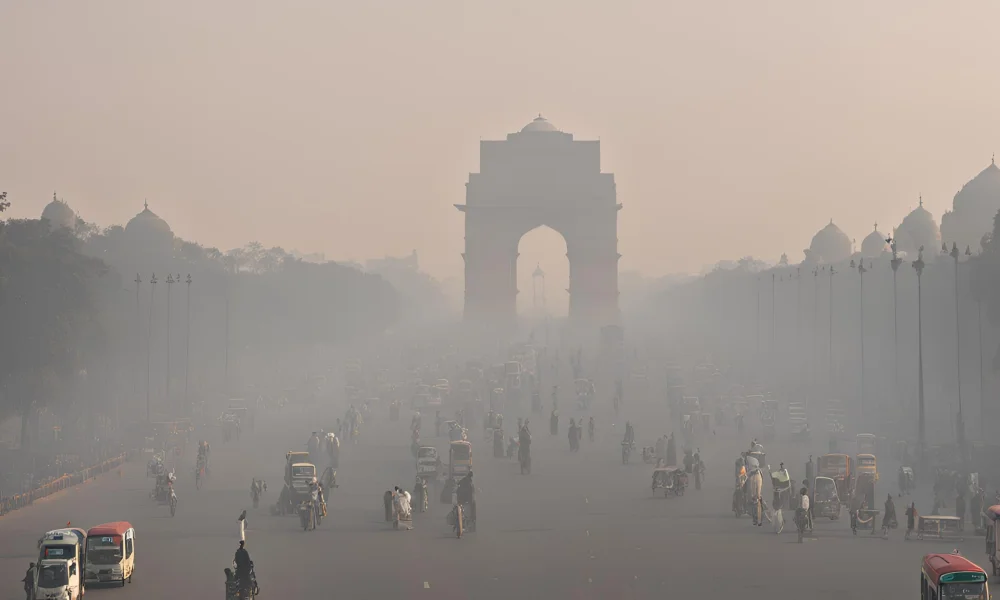Air Pollution is No Longer an Environmental Issue, it is a Health Issue

TABLE OF CONTENTS
Picture this: you step outside on a crisp November morning, only to be greeted by a dense smog that stings your eyes and chokes your lungs. The culprit? Air pollution. Once dismissed as a mere environmental concern, air pollution has now crossed into the section of public health crises, affecting billions of lives worldwide—and none more so than in India.
Let’s understand why this shift in perspective is crucial and how the health of entire populations hangs in the balance.
From Environment to Emergency
For decades, air pollution was seen as a backdrop to the larger narrative of industrial growth. Factories giving out smoke meant progress; cars on the road symbolised development. But the effects of pollution have grown, and its impact has become much more deadly.
Take Delhi, for instance, where the air quality routinely dips into the "severe" category. PM2.5 levels—those minuscule particles capable of lodging deep within our lungs—frequently exceed 400 µg/m³, a far cry from the WHO’s recommended 24-hour safe limit of 15 µg/m³. According to the latest Air Quality Life Index 2024 by the Energy Policy Institute at the University of Chicago (EPIC), Delhi’s pollution levels are so dire that life expectancy could be reduced by up to 12 years for residents. This is not just a statistic—it’s a staggering reality.
Despite a 19.3% reduction in particulate pollution in 2022, more than 40% of India’s population continues to breathe air that fails to meet even national standards. Let that sink in. The air we take in every few seconds is slowly shaving years off our lives.
How Pollution Becomes a Health Hazard
To understand why air pollution is now primarily a health issue, let’s break it down into its effects:
1. Respiratory Illnesses
The air we breathe contains particulate matter (PM), nitrogen oxides (NOx), sulphur dioxide (SO2), and volatile organic compounds (VOCs). Of these, PM2.5 is particularly harmful due to its ability to penetrate deep into the lungs and enter the bloodstream. For residents in cities like Delhi, constant exposure to these pollutants manifests as coughing, wheezing, and difficulty breathing.
Asthma cases have skyrocketed in heavily polluted areas, especially among children. The fine particles inflame airways and trigger asthmatic reactions, making polluted cities a health hazard for young lungs. In fact, many children in urban India grow up with reduced lung capacity, which can lead to chronic conditions later in life. Dr. Swaminathan highlighted at COP29 that respiratory illnesses caused by air pollution have become so prevalent that no demographic is spared. Schools report rising absenteeism due to illnesses linked to poor air quality, and families face mounting healthcare costs.
For adults, conditions such as bronchitis and Chronic Obstructive Pulmonary Disease (COPD) are on the rise, further burdening public health systems.
2. Cardiovascular Problems
While air pollution is often thought of as a lung-related issue, its impact on cardiovascular health is equally alarming. Prolonged exposure to polluted air causes systemic inflammation in the body, which is a key factor in heart diseases. The tiny particles in polluted air can enter the bloodstream, causing blood vessels to narrow, harden, and even form clots. These changes significantly increase the risk of hypertension, heart attacks, and strokes.
For people living in areas with consistently high PM2.5 levels, such as Delhi, these risks are compounded. Studies have shown that individuals in such regions are more likely to suffer heart-related fatalities at younger ages compared to those in cleaner environments. The World Health Organization (WHO) has linked nearly 25% of global cardiovascular deaths to air pollution, a figure that cannot be ignored in the Indian context.
3. Chronic and Long-Term Diseases
The damage caused by polluted air doesn’t stop with the lungs and heart. Over time, it affects nearly every organ in the body. Chronic exposure has been associated with:
Anaemia: Pollutants like lead and other heavy metals in the air interfere with haemoglobin production, reducing the blood’s capacity to carry oxygen.
Diabetes: Emerging research suggests that air pollution can induce insulin resistance, a precursor to Type 2 diabetes.
Kidney Disease: Studies link long-term exposure to polluted air with reduced kidney function, which can lead to chronic kidney disease.
What’s even more concerning is the connection between air pollution and mental health. Research indicates that pollutants can affect brain chemistry, increasing the risk of depression, anxiety, and even neurodegenerative diseases like Alzheimer’s. Children exposed to high pollution levels are also at risk of cognitive impairments, affecting their academic performance and overall development.
4. Impact on Vulnerable Populations
Certain groups bear a disproportionate burden of air pollution’s health effects. Pregnant women, for instance, face a higher risk of complications, including premature births, low birth weights, and developmental disorders in their babies. The harmful chemicals in polluted air cross the placental barrier, directly affecting foetal growth and health.
Elderly individuals are another vulnerable demographic. Pre-existing conditions like heart disease, diabetes, and respiratory issues make them particularly susceptible to the toxic effects of pollution. For many senior citizens, prolonged exposure accelerates the progression of age-related diseases, reducing their quality of life.
Children are perhaps the most affected group. Their developing lungs and immune systems make them far more vulnerable to air pollution compared to adults. Studies show that children living in high-pollution areas are at greater risk of stunted lung growth, asthma, and frequent respiratory infections, which can have lifelong repercussions.
Delhi’s Public Health Emergency
The national capital is not just an epicentre of pollution but a glaring example of its health toll. Every winter, as crop stubble burns in neighbouring states and weather patterns trap pollutants, Delhi transforms into a gas chamber. Experts have called for an urgent shift to clean energy to combat what they label a "public health emergency."
But let’s be honest—it’s not just Delhi. The entire Indo-Gangetic plain suffers from similar levels of hazardous air quality. The ripple effects are visible in overcrowded hospitals, ailing children, and rising healthcare costs
Climate Change and Health
Air pollution doesn’t exist in isolation—it’s intricately tied to climate change. At COP29, Dr. Swaminathan pointed out that almost every Indian is vulnerable to climate-related health risks. The impacts range from immediate effects, like respiratory illnesses due to polluted air, to long-term challenges like malnutrition caused by disrupted agricultural cycles.
Think about it: when air pollution stunts crop growth or alters rainfall patterns, it’s not just an environmental issue—it’s food security and public health at stake.
Despite the challenges, there’s reason to be optimistic. Awareness about the dangers of air pollution is growing, as is the demand for cleaner air. Technological advancements, such as low-cost air quality monitors and pollution mitigation strategies, offer new tools to fight this battle.
Take heart from the fact that global cities like Beijing have successfully turned the tide on pollution with coordinated efforts. India, with its ingenuity and resilience, can do the same.
Final Thoughts
Air pollution is no longer just an environmental issue—it’s a direct attack on our health. The smog-filled skies are a stark reminder that every breath we take carries consequences. But with urgent action and collective will, we can reclaim our right to clean air and a healthier future.
As the data shows, addressing air pollution isn’t optional—it’s a necessity for survival. The question isn’t whether we can afford to act, but whether we can afford not to. Let’s choose action, innovation, and hope—for ourselves, our children, and generations to come.
If you or someone in your family is suffering from the harmful effects of air pollution and need help, then visit a tertiary-care hospital near you as soon as possible! Take action today and ensure that you’re in charge of your health!






